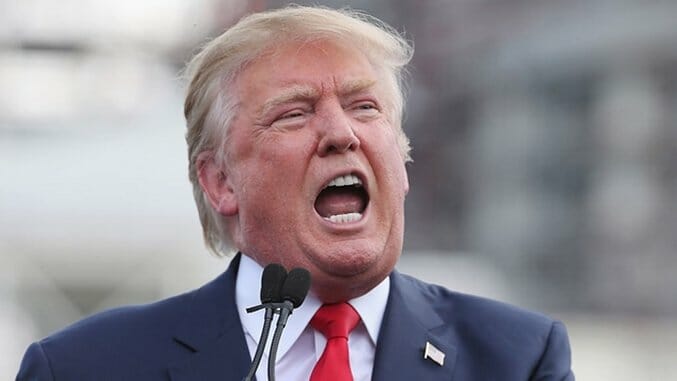Trump Ending DACA Is about Pandering to White Grievance
Even if the Program is Unconstitutional
Photo by Chip Somodevilla/Getty
DACA, which stands for Deferred Action for Childhood Arrivals, is the newest policy in the crosshairs of the Trump administration. The program allows undocumented immigrants who entered the country as minors to obtain a renewable two-year period of deferred action from deportation and eligibility for a work permit. In short, it’s a humane and realistic short-term solution to a problem that is bereft of a simplistic fix: what to do with children brought here as illegal immigrants through no fault of their own. To qualify, someone must have entered the United States before turning 16, lived in the country continually since 2007, and have committed no serious crimes. There are roughly 800,000 covered under this program, and Trump has now proposed deporting a group of people virtually equal in size to the population of San Francisco.
Because Donald Trump doesn’t have the capacity to feel empathy, and views everything within his purview as something to be used as leverage to please his white nationalist base, this program has been under threat since his inauguration. During the campaign, Trump vowed to “immediately terminate” DACA. To be fair, whether DACA is legal is a wholly legitimate question, and all evidence points to it being a classic example of executive overreach. Per the NYT:
In 2015, Texas and 25 other states won a federal court ruling blocking the Obama administration from extending deferred action to an estimated five million undocumented parents of children who were citizens or legal residents, as well as to young immigrants who arrived between 2007 and 2010. The ruling was upheld on appeal, and last year, the Supreme Court split 4 to 4, leaving the lower court’s decision in place.
The issue, as with almost all our problems, is that Congress did not move on this problem initially, so in order to create some sort of solution for those living in limbo, the Obama Administration acted unilaterally to try to fix it, and out of the failure of the Dream Act in Congress, DACA was born. This wouldn’t be the clusterfuck that it is if Congress had done their job in the first place, as a Republican involved in the policy negotiations told McClatchy: “Who cares about DACA if there’s a Dream Act.”
But alas, as countless policies have demonstrated over the years (like sequestration, a bill that passed which was intentionally designed to be too stupid to pass), Congress will not act on an issue until the penalty for inaction exceeds the benefits of apathy. Trump’s bluster and supreme idiocy may have changed that calculus. Per the NYT this morning:
As late as one hour before the decision was to be announced, administration officials privately expressed concern that Mr. Trump might not fully grasp the details of the steps he was about to take, and when he discovered their full impact, would change his mind, according to a person familiar with their thinking who spoke on condition of anonymity without authorization to comment on it.
Thanks to a combination of apathy on the part of Congress, along with Trump’s nativist instinct, a bunch of people who are de facto American citizens now find their legal status in jeopardy, as Jeff Sessions announced today that the administration would be ending the perilous middle ground set up by the Obama Administration known as DACA. Now that Trump has backed Congress into a corner where they must choose between mass deportations and doing their job, we’re beginning to see some action from the Kings of Inaction, at least through words.
I intend to introduce legislation addressing the legal status of undocumented children. (3/9)
— Senator Thom Tillis (@SenThomTillis) September 5, 2017
McCain calls WH decision to end DACA the “wrong decision.” Says he will work with colleagues to pass comprehensive immigration reform. pic.twitter.com/AKYCtPI6aG